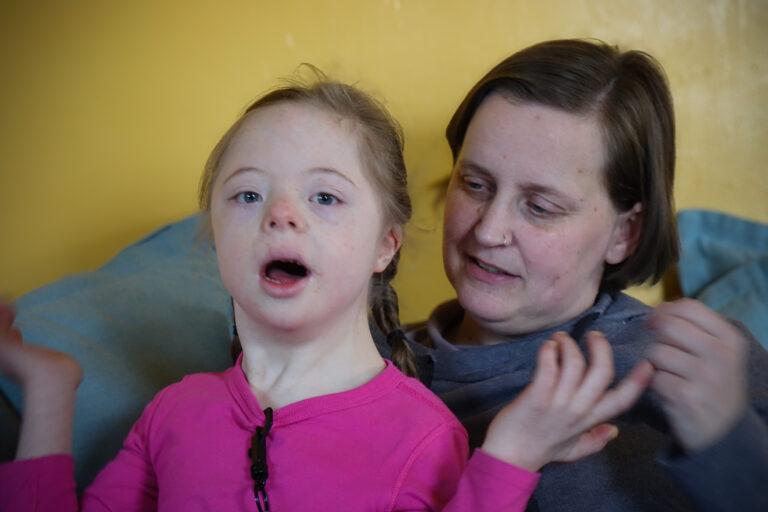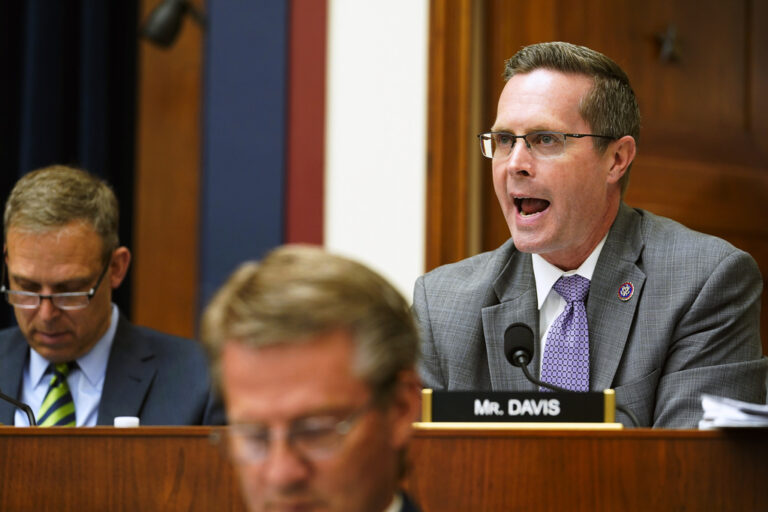Since the pandemic-era freeze on Medicaid disenrollment ended this spring, millions across the country –– including eligible recipients –– have lost their coverage for administrative reasons.
Paperwork errors, system glitches, long wait times and outdated notices are kicking people off the rolls and vexing those caught up in the process. For people with disabilities, the sudden loss of coverage can bring devastating consequences and little recourse. Some say they’ve had to cut back on hours of crucial home assistance and skip medications they relied on as they struggle to get their coverage back.
Andrea Mae and her family are among those who were feeling scared and frustrated after being dropped.
For Mae, a single mother of three children, each with critical, life altering health needs, sleep has been a luxury lately.
“Yeah, sleep is an interesting thing,” Mae said. “I get it when I can.”
Mae lives in Muncie, Ind. Her middle daughter Shiloh, 12, has epilepsy, hypothyroidism, down syndrome and is hard of hearing. Shiloh also relies on a wheelchair and a G-tube to get liquids and water. Because of her disability, she’s been on the Medicaid program for the aged and disabled, which pays for a caregiver to help her with basic daily needs.
“Her waiver pays me to be her caregiver,” Mae said. “So I get paid when she’s with me, just for caring for her, which is actually amazing because, especially once COVID hit, the amount of respite workers is just zero for the most part and so trying to get care for her from anybody else was basically impossible.”
Mae, 41, went back to college to finish a degree in special education. The Medicaid stipend provides most of her income to cover the bills and put food on the table.
That’s until the great unwinding of Medicaid.

Since the federal COVID public health emergency expired in April 2023, states have been sifting through their Medicaid rolls to kick those who no longer qualify. An analysis by KFF, a health policy nonprofit, shows that most of the 330,413 people who were dropped from Medicaid so far in Indiana, lost their coverage for procedural reasons, which means many may still be eligible for it.
Without Medicaid, Mae had to pick and choose which medicines to give Shiloh. She decided to give her the medicines that “she had to have to not die”, for the seizures and hormonal deficiencies.
“She has pretty intense ADHD. She’s super impulsive. She didn’t take ADHD meds,” Mae said. “And she went to school without it. And it was a struggle there. And I was like, ‘She’s not going to learn. I get that. I’m sorry, guys. Like, I don’t know what else to do.’”
Shiloh was very impulsive that it got dangerous at home. Mae couldn’t cook or take a shower while Shiloh was awake. And without a stipend, Mae burnt through her savings. She had to pay more than $400 out of pocket every two weeks for the medicines Shiloh did take.
They did everything right, they lost coverage anyway
But why did Mae’s family lose their insurance? That’s what Mae tried to figure out for weeks.

First her youngest son, Asher, lost his coverage in May. The Family and Social Services Administration, which manages Medicaid in Indiana, told Mae they had sent a letter notifying her of missing paperwork. But Mae never saw that letter. She went to the local office, in-person, and turned in all the documents: paystubs, proof of income and child support.
“And within a couple of weeks, my son had been reinstated – his Medicaid came back,” she said.
Mae felt she had done everything right. But a couple of months later, Mae and her two daughters, including Shiloh, were dropped from Medicaid anyway.
Mae went to the office many times and broke down crying on the phone. The caseworkers were kind and wanted to help, she said, but they could not fix the problem.
“They were like, ‘Yeah, we see it in the system and we’re just waiting on the computer, [it] has to do something before it can, like, overwrite it and reinstate their insurance,’” she said.
It took more than a month before the family’s Medicaid was reinstated.
In response to questions in December, the FSSA said they were not experiencing any computer system-related issues. A spokesperson said they can’t comment on specific beneficiaries’ cases unless authorized to do so. They also added that the Division of Family Resources, the subdivision responsible for assessing eligibility for assistance programs including Medicaid, has invested in beefing up and training staff in preparation for the unwinding.
“The Division of Family Resources prepared for the unwind process by adding 300 staff to assist with the Medicaid eligibility redetermination process,” Michele Holtkamp, FSSA spokesperson, said. “Their training included all facets of Medicaid focusing on redetermination processing.”
But Medicaid navigators, patient advocates and people with disabilities reported encountering case workers who had limited knowledge of specific Medicaid programs, some providing incomplete or faulty information.
“Every time that you call, there's never a great answer,” said Jordan Dickey, an Indiana man who was on the Medicaid program for people with disabilities.
He got a letter in the summer from the Social Security Administration that said they no longer considered him disabled and accordingly, he’s no longer eligible for Medicaid.
But he has distal spinal muscular atrophy and relies on a wheelchair. His disability is lifelong.
He uses the Medicaid waiver to pay for an aide who helps with basic things like using the restroom and getting dressed. Since his Medicaid was dropped, he’s been paying out of pocket and has reduced the number of hours he gets help.
It’s been a month.
“A lot of times when you call [the state Medicaid office] they are like, ‘Oh, man, I've never even heard of that program before,’” Dickey said.
He recalled a time he was on the phone with a caseworker for an hour and a half to ask about the letter: “And [the caseworker] just kept saying, ‘Man, I wish my boss was here.’ And I’m like, ‘that's not helpful.’”
Even an attorney was not spared
Emily Munson has spinal muscular atrophy. The condition qualifies her for Medicaid waiver and a program called MED Works, which allows her to work and pay a monthly premium to continue getting services.
Munson is an attorney at the Indiana Disability Rights, a federally-funded agency that helps people with disabilities. She is as savvy as it can get with the system. Still, she too was not spared.
In the summer, she received notice from the state saying her Medicaid will be terminated soon because she has too much income. But she learnt that the state was wrongly calculating her income.
“Somehow, they were claiming that my sister's bank account was part of my money, thinking that we're in the same household, even though MedWorks is not calculated that way. I'm an individual not a household,” she said.
Munson filed a timely appeal and got scheduled for a hearing.
But before the hearing was held, she discovered the coverage was dropped when picking up her medicines at the pharmacy. Once free, three pills cost her $70.
Medicaid navigators and patient advocates say they regularly encounter people like Munson — losing coverage despite their best effort.
“We've heard stories of folks who are using the online portal, they are going into the physical office, they're faxing in their paperwork, they're getting all of the paperwork in there, so that that procedural disenrollment isn't happening. And their paperwork is not getting properly attached even to their cases,” Natasha Crespo, an attorney with Indiana Disability Rights, said.
What worries Crespo the most is people with little knowledge and expertise to navigate the system. She said many of them do not appeal the state’s decision.
“Because they just go by what the letter tells them: ‘My coverage is already discontinued. I've missed my deadline. I don't know what to do,’” she said
Crespo suggests people reach out to Medicaid navigators and organizations like hers to help them appeal as soon as possible when their coverage is being dropped.
Resources for Medicaid beneficiaries in Indiana:
- Covering Kids and Families
- Indiana Disability Rights
- Indiana Legal Services
- Open Door Health Services
Side Effects Public Media is a health reporting collaboration based at WFYI in Indianapolis. We partner with NPR stations across the Midwest and surrounding areas — including KBIA and KCUR in Missouri, Iowa Public Radio, Ideastream in Ohio and WFPL in Kentucky.
9(MDM5MjE5NTg1MDE1Mjk1MTM5NjlkMzI1ZQ000))







